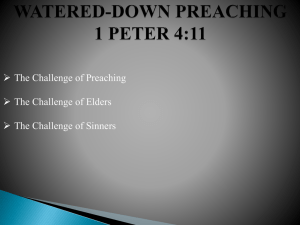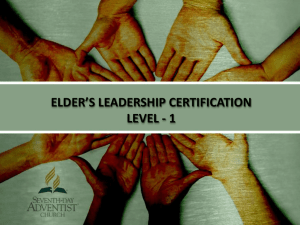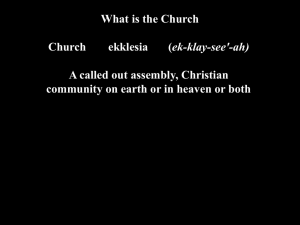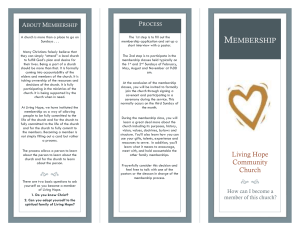Elder - United Church of Christ
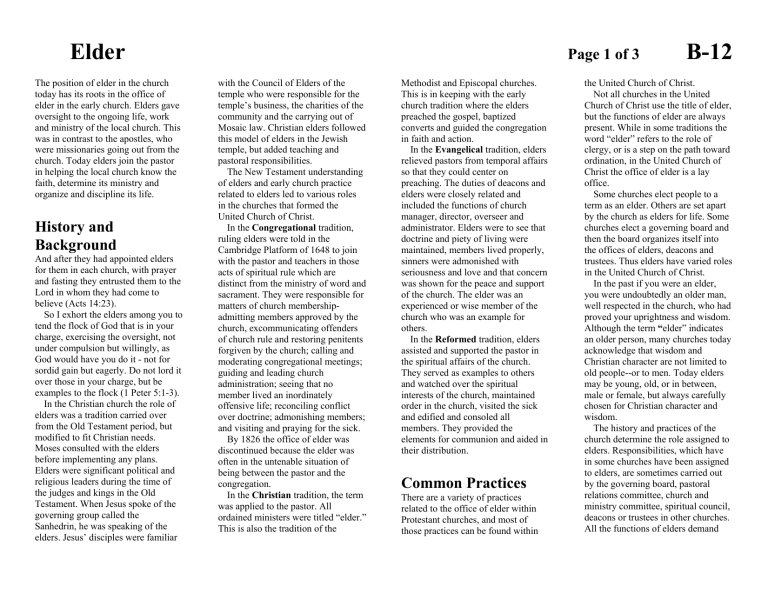
Elder
The position of elder in the church today has its roots in the office of elder in the early church. Elders gave oversight to the ongoing life, work and ministry of the local church. This was in contrast to the apostles, who were missionaries going out from the church. Today elders join the pastor in helping the local church know the faith, determine its ministry and organize and discipline its life.
History and
Background
And after they had appointed elders for them in each church, with prayer and fasting they entrusted them to the
Lord in whom they had come to believe (Acts 14:23).
So I exhort the elders among you to tend the flock of God that is in your charge, exercising the oversight, not under compulsion but willingly, as
God would have you do it - not for sordid gain but eagerly. Do not lord it over those in your charge, but be examples to the flock (1 Peter 5:1-3).
In the Christian church the role of elders was a tradition carried over from the Old Testament period, but modified to fit Christian needs.
Moses consulted with the elders before implementing any plans.
Elders were significant political and religious leaders during the time of the judges and kings in the Old
Testament. When Jesus spoke of the governing group called the
Sanhedrin, he was speaking of the elders. Jesus’ disciples were familiar with the Council of Elders of the temple who were responsible for the temple’s business, the charities of the community and the carrying out of
Mosaic law. Christian elders followed this model of elders in the Jewish temple, but added teaching and pastoral responsibilities.
The New Testament understanding of elders and early church practice related to elders led to various roles in the churches that formed the
United Church of Christ.
In Congregational tradition, ruling elders were told in the
Cambridge Platform of 1648 to join with the pastor and teachers in those acts of spiritual rule which are distinct from the ministry of word and sacrament. They were responsible for matters of church membershipadmitting members approved by the church, excommunicating offenders of church rule and restoring penitents forgiven by the church; calling and moderating congregational meetings; guiding and leading church administration; seeing that no member lived an inordinately offensive life; reconciling conflict over doctrine; admonishing members; and visiting and praying for the sick.
By 1826 the office of elder was discontinued because the elder was often in the untenable situation of being between the pastor and the congregation.
In Christian tradition, the term was applied to the pastor. All ordained ministers were titled “elder.”
This is also the tradition of the
Methodist and Episcopal churches.
This is in keeping with the early church tradition where the elders preached the gospel, baptized converts and guided the congregation in faith and action.
In Evangelical tradition, elders relieved pastors from temporal affairs so that they could center on preaching. The duties of deacons and elders were closely related and included the functions of church manager, director, overseer and administrator. Elders were to see that doctrine and piety of living were maintained, members lived properly, sinners were admonished with seriousness and love and that concern was shown for the peace and support of the church. The elder was an experienced or wise member of the church who was an example for others.
In Reformed tradition, elders assisted and supported the pastor in the spiritual affairs of the church.
They served as examples to others and watched over the spiritual interests of the church, maintained order in the church, visited the sick and edified and consoled all members. They provided the elements for communion and aided in their distribution.
Common Practices
There are a variety of practices related to the office of elder within
Protestant churches, and most of those practices can be found within
Page 1 of 3
B-12 the United Church of Christ.
Not all churches in the United
Church of Christ use the title of elder, but the functions of elder are always present. While in some traditions the word “elder” refers to the role of clergy, or is a step on the path toward ordination, in the United Church of
Christ the office of elder is a lay office.
Some churches elect people to a term as an elder. Others are set apart by the church as elders for life. Some churches elect a governing board and then the board organizes itself into the offices of elders, deacons and trustees. Thus elders have varied roles in the United Church of Christ.
In the past if you were an elder, you were undoubtedly an older man, well respected in the church, who had proved your uprightness and wisdom.
Although the term “ elder” indicates an older person, many churches today acknowledge that wisdom and
Christian character are not limited to old people--or to men. Today elders may be young, old, or in between, male or female, but always carefully chosen for Christian character and wisdom.
The history and practices of the church determine the role assigned to elders. Responsibilities, which have in some churches have been assigned to elders, are sometimes carried out by the governing board, pastoral relations committee, church and ministry committee, spiritual council, deacons or trustees in other churches.
All the functions of elders demand
Elder close, open interaction with the pastor.
Elders often work with other boards and committees.
Responsibilities
Here are typical responsibilities carried out by elders. Your church needs to be clear about which of these, or other responsibilities, are yours as an elder:
•
Defining your own responsibilities.
•
Establishing clear and workable directions, goals and plans of action.
•
Helping the congregation understand and value the work of the elders.
•
Developing a budget for use by the elders.
•
Insuring that your church has an overall sense of its purpose and mission.
•
Insuring that your church is clear about its major ministry and mission objectives, and sets plans to accomplish them.
•
Reviewing and evaluating the programs and activities of your church to insure they are faithful to the tradition of the church and consistent with your ministry and mission objectives.
•
Encouraging members to partake regularly in communion, contribute to the financial support of the church and attend services. In some churches members are removed from the active members’ list or roll if they do not participate in any of these ways for a specified period of time.
•
Forming a council responsible for the discipline of members, reviewing applicants for church membership, contacting members who do not attend worship, and determining who should be removed from church rolls.
•
Letting the pastor know about the pastoral needs of members and about potential new members.
•
Letting the appropriate people know about members who are having personal or professional problems or problems related to the church and ministering to these people yourself.
•
Letting the appropriate people know about members and their families who are sick, and ministering to these people yourself.
•
Reviewing the confirmands’ instruction in the faith and authorizing their confirmation.
•
Accompanying the pastor when communion is served to persons who are shut-in.
•
Preparing for and assisting the pastor in serving communion.
•
Accompanying the pastor in visits to families facing crises and difficulties.
•
Functioning as a pastoral relations committee.
•
Leading the annual stewardship education and promotion program.
•
Attending meetings of the board of elders and representing that board on other committees.
•
Attending church services regularly.
•
Working at the resolution of conflicts that arise within the congregation.
Skills and Attributes
Needed
•
Christian character and good works that give you the respect of church members.
•
Faithfulness as a Christian.
•
Willingness to be a servant of God, of God’s people and of the church.
•
Knowledge of the Christian faith and the tradition of the Christian
Church.
•
Willingness to pray aloud.
•
Willingness to maintain confidences.
•
Ability to listen.
•
Ability to communicate ideas clearly.
•
Ability to relate well with the church staff in openness and trust.
•
Understanding of how groups function.
•
Knowledge of how to motivate members to perform needed ministries.
•
Ability to manage conflict productively.
•
Knowledge of the people in the congregation.
•
Knowledge of the denomination.
Ways to Increase
Skills, Knowledge and
Effectiveness
•
Talk with people who have been elders.
Page 2 of 3
B-12
•
Ask for a position description outlining responsibilities, expectations and accountability.
•
Learn about communion and confirmation through intentional study.
•
Increase your personal spiritual life through daily Bible reading, meditation and prayer.
•
Participate in worship and prayer with other elders at regular meetings or a retreat.
•
Work with other officers of the church to develop a continuing education program designed specifically for church officers.
•
Read and attend workshops to increase your skill in dealing with conflict and in human relations.
•
Attend workshops and seminars sponsored by your association or conference, ecumenical groups, or colleges and universities on topics such as communication, membership and visiting.
•
Learn about policy development and planning in a nonprofit organization.
•
Consider organizing your church for care giving ministries. Use
Called to Care: A Notebook for
Lay Caregivers from the Parish
Life and Leadership.
Called to
Care includes resources that strengthen care giving skills, train church members in visitation and address over 50 life situations that elders or other caregivers may encounter in their ministry. Order from United Church of Christ
Resources, (800)537-3394.
Elder
•
Read and study The Gift of
Administration by Thomas
Campbell (Louisville, KY:
Westminster/John Knox Press,
1981), paying particular attention to the chapter “The Administrator as Elder.”
•
Ask association and conference staff and leaders for help.
•
Work at becoming familiar with the names of church members and potential members and then with the people themselves.
•
Read books and articles related to current issues facing your church and its members.
•
Observe the pastor in settings you may later serve in alone.
Issues Facing the
Church
•
The word “ elder” implies that the person is old. How does your church deal with this implication
7
•
In some churches elders have been ordained to carry out their work.
They are ordained for life, although they may not serve as an elder for life. Some people think ordination should be reserved for clergy. What do you think and why?
•
The spiritual leadership of the church is frequently seen as the responsibility of the pastor. What is the role of lay leaders in spiritual matters?
Questions
•
Review the introduction, which describes the purpose of the elder.
How does it challenge your understanding of the role of an elder?
•
Review information on other offices such as: Deacon, Pastoral
Relations Committee Member,
Governing Board Member and
Trustee to see responsibilities that need to be met. How are these functions carried out and coordinated in your church?
•
Once you have discovered exactly what functions belong to you, what facets of service do you need to work on? How might you do it?
Page 3 of 3
B-12
© 2005, Parish Life and Leadership Ministry
Team of Local Church Ministries, a
Covenanted Ministry of the United Church of
Christ



